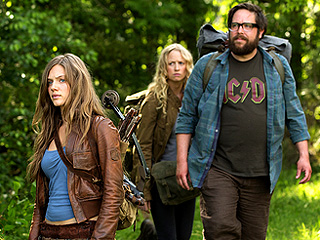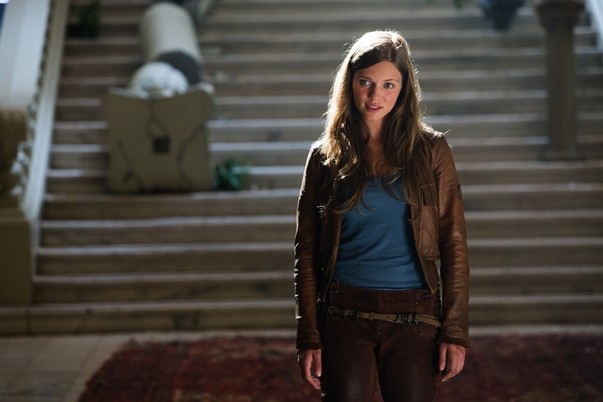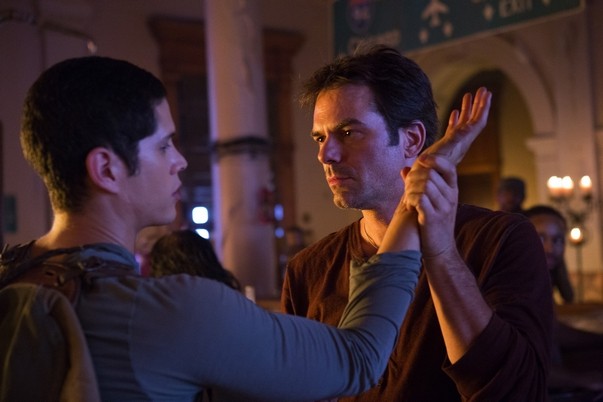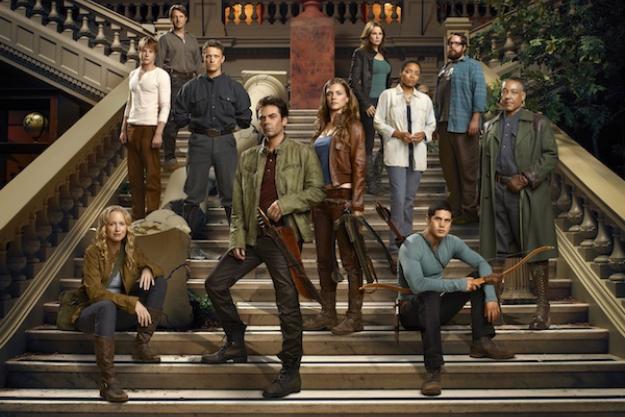What do you get when you line up producer J.J. Abrams, Supernatural writer Eric Kripke, and director Jon Favreau behind a post-apocalyptic dystopian adventure set in a destroyed America? You get Revolution, the NBC drama that’s been making the biggest splash of all the new science fiction/fantasy network TV offerings for this coming fall season. Now that the first episode has been released on NBC.com for preview, before its televised debut on September 17th, I’m doing a rundown on the best and worse that Revolution has to offer.
(Spoiler warning: First episode unpacked and analyzed here!)
First off, you get the immediate sense that Revolution knew the fan base it was going for when it created its dystopian future. With a Hunger Games knock-off protagonist and shots straight out of the barren beauty of The Walking Dead, it works to inspire the hometown patriotism of the long-canceled Jericho and mixes it with the mystery of Lost. Still, the premise of the show asks the audience to leap some massive chasms of disbelief to accept the set-up. The world goes to hell because some mysterious problem causes all electronic equipment across the globe to shut down. But what about batteries, you ask? Don’t worry, those don’t work either. Electricity itself seems to have gone kaput and damn the laws of physics. Everything from cars to cell phones have shut down, along with airplanes, which rain down like falling stars during the show’s opening. But one man knows that it’s coming. Bill Matheson rushes home to his family just before the lights go out and secures something on the prettiest flash drive ever just before modern society goes away. He huddles with his family in the dark while, far away, his brother Miles gets out of his car on a highway now dark in every direction.
 So starts Revolution, and for a show-opener I have to admit that it delivers on suspense. Still, it all just falls into the Solidly Mediocre category from there. We pick up fifteen years later with Bill and his kids Charlie and Danny living in an idyllic little town in what used to be suburbia. Rounding out their little town are the ragtag survivors, animals, one former Google exec named Aaron, and Bill’s pretty British girlfriend/doctor Maggie. Charlie has grown up to be a Katniss Everdeen look-alike, family-oriented, tough-yet-vulnerable. Her brother Danny is a perfect Peeta clone, stubborn but with his own vulnerability (he has asthma) which slows him down. The show takes the time to show off the family dynamic—Bill as overprotective father, there’s an awkward sort of stepmother relationship, and Charlie’s has a dreamy fascination with recapturing the past. Then soldiers show up from the Monroe Republic militia and everything goes to hell. Events set Charlie out on the road looking for her Uncle Miles and away we go into the wilds of the post-electric America. The show revolves around Charlie and her resolution to find her uncle and solve the mystery that brought the soldiers to her home.
So starts Revolution, and for a show-opener I have to admit that it delivers on suspense. Still, it all just falls into the Solidly Mediocre category from there. We pick up fifteen years later with Bill and his kids Charlie and Danny living in an idyllic little town in what used to be suburbia. Rounding out their little town are the ragtag survivors, animals, one former Google exec named Aaron, and Bill’s pretty British girlfriend/doctor Maggie. Charlie has grown up to be a Katniss Everdeen look-alike, family-oriented, tough-yet-vulnerable. Her brother Danny is a perfect Peeta clone, stubborn but with his own vulnerability (he has asthma) which slows him down. The show takes the time to show off the family dynamic—Bill as overprotective father, there’s an awkward sort of stepmother relationship, and Charlie’s has a dreamy fascination with recapturing the past. Then soldiers show up from the Monroe Republic militia and everything goes to hell. Events set Charlie out on the road looking for her Uncle Miles and away we go into the wilds of the post-electric America. The show revolves around Charlie and her resolution to find her uncle and solve the mystery that brought the soldiers to her home.

Considering that Charlie is supposed to be the main character, it’s Tracy Spiridakos’ performance that I’d cite as the major weakness of the pilot. Charlie’s doe-eyed innocence about the world outside her town’s walls, right down to lines like “They can’t all be bad!” makes her seem either willfully ignorant or foolish in a world that wouldn’t really be kind to either. Her brother Danny on the other hand is brave but foolhardy, and yet I found myself rooting for him throughout the episode, more so than for Charlie. Danny’s storyline was certainly more interesting, as an asthma attack brings him into contact with Grace, a mysterious woman living out in the middle of nowhere.
 Spiridakos also cannot hold a candle to Billy Burke as Miles, who brings a brooding, rakish charm to the table and backs it up with some Book of Eli-style sword fighting that kept me glued to the action. He is a surprisingly intriguing character, meant to provide our insight into the past as well as playing the role of reluctant hero, and Burke does both very well.
Spiridakos also cannot hold a candle to Billy Burke as Miles, who brings a brooding, rakish charm to the table and backs it up with some Book of Eli-style sword fighting that kept me glued to the action. He is a surprisingly intriguing character, meant to provide our insight into the past as well as playing the role of reluctant hero, and Burke does both very well.
Miles and Charlie are both light years ahead of J.D. Pardo, who plays the hunky bow hunter Nate, telegraphed as the love interest for Charlie. His boisterous teenage machismo is almost laughable against Burke’s genuine presence and it devalues Pardo’s character in nearly every scene that the two of them share.

Hands down, the most compelling actor on the entire show has to be Homicide and Breaking Bad alum Giancarlo Esposito as Captain Neville. As head of the militia out to get Bill Matheson, Esposito brings a not-so-subtle menace to Neville, germaphobically urbane in a brutal world. He is a henchman to General Monroe through and through, but written with intelligence and a simmering rage that lives just under the surface. I’m excited to see more of what he brings to the action and his relationship with General Monroe, whose story lies at the heart of a lot of the mystery of the plot.
And I’m terribly sad that Lost’s former Juliet, Elizabeth Mitchell seems to exist only in flashback. She’s a phenomenal actress who I’d love to see more of—can we see a Grimm-like mom reappearance, please?
All in all, for a show called Revolution there seems to be a lot here that is old hat. The heroine is as recycled as some of the shots used in the show, right down to the easily recognizable quarry used in the Shane-beating episode of the first season of The Walking Dead. We even have (major end of episode spoiler here) a hidden communication device, capable of talking to some mysterious stranger on the other end, shades of the computer in the hatch in Lost or the typewriter talking to the other dimension in Fringe. Still, the hook for the show has me interested enough to keep watching in the hopes that Charlie develops out of her post-apoc ingenue phase and into her own character. Billy Burke and Giancarlo Esposito alone could bring me back if only to wonder how Captain Neville keeps his coat so clean, and whether or not Miles will end up hooking up with the British doctor or just murder his way across half of America. Plus, will Aaron grow out of his “I was once a giant computer nerd” phase and become a real Jericho-style hero?
For these reasons alone, I’m onboard for more of season one. I can only hope Revolution remembers that it’s okay to do something different with the setting of a destroyed future America, or else this show might fall sadly short of being revolutionary.
Shoshana Kessock is a comics fan, photographer, game developer, LARPer and all around geek girl. She’s the creator of Phoenix Outlaw Productions and ReImaginedReality.com.










